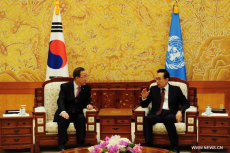
By 1947 it became clear to the United States that the USSR would not allow a nationwide US backed government and so they initiated UN backed plans for elections within their Southern zone. These ‘democratic’ elections in Korea were anything but democratic, alienating the North entirely and even many of the parties in the South, ensuring the rule of US favourite candidate Syngman Rhee (who ironically was born in North Korea though they were not divided then). The US then had the audacity to approach the UN with the issue of Korean independence, suggesting that the entire nation should be unified under one rule (i.e. US puppet Syngman Rhee). The US tactfully approached the UN General Assembly rather than the Security Council as the General Assembly could, according to the UN charter, only recommend action and could not be discussed and vetoed by the Soviet Union like the Security Council discussions could be. We must bear in mind that many of these events were classified until recently and so the rest of the world didn’t necessarily know what the US were doing. Therefore by not identifying these clear acts of corruption on the part of the US and supporting their elections in the South and alienation of the North, the UN indirectly created an even deeper rooted divide in Korea. The Soviet Union appealed to the UN for the recognition of the independence of the national Korean resistance but it was passed only after numerous US alterations. At risk of too much narrative we shall conclude this point here, as we have shown that there are numerous instances of bias and poor practise by the United Nations in the division of Korea and ensuing electoral processes. All of the above accumulates to the fact that the UN allowed too much foreign influence in Korea which ultimately became a proxy nation in early Cold War hostilities, driving a deep divide down the heart of the nation.
We have seen then that much of the blame upon the UN for Korea’s division to this day lies in their support of the US. In order to therefore ascertain to what extent the UN truly had a choice in the matter we must explore what level of control the US held over it. One must excuse the following background narrative as it is essential detail prior to the main argument. The United Nations was founded with the main purpose of succeeding where the League of Nations had failed after the First World War, a body which the US had little involvement with once it was actually ratified. Emerging from isolationism and realising their potential over Europe during the Second World War the United States instigated a ‘United Nations’ body in the Atlantic Charter of 1942 in order to help in ‘maintaining peace and stability’, thus strengthening their image on the moral compass and establishing themselves in the global theatre. Indeed Roosevelt is said to have considered the UN the greatest achievement of his political career and once ratified in 1945 it is notable that the member states given the power of veto were the United States, France, the United Kingdom, the USSR and China. France and the United Kingdom were the US’ main allies, the Republic of China it wished to bolster against the Chinese Communist Party and the USSR were too large and powerful to ignore. Therefore it would not be unreasonable to suggest that it was very much in the United States’ favour to control the United Nations, keeping a close grip over their allies and opposition alike. Furthermore, the US’ main strength over the rest of the world in 1945 was its economy and thanks to the United Nations it was able to promote world markets and trade through the World Bank, thus further strengthening America. Even today the US dominance can be seen as the United Nations’ headquarters are situated in the heart of New York City. All of the above is to emphasise that clearly the United States of America benefited greatly from the existence of the United Nations, so the greater question now for our purpose is to consider how far the US influenced UN actions in and around the Korean War 1950-53.

0 Comment:
Be the first one to comment on this article.